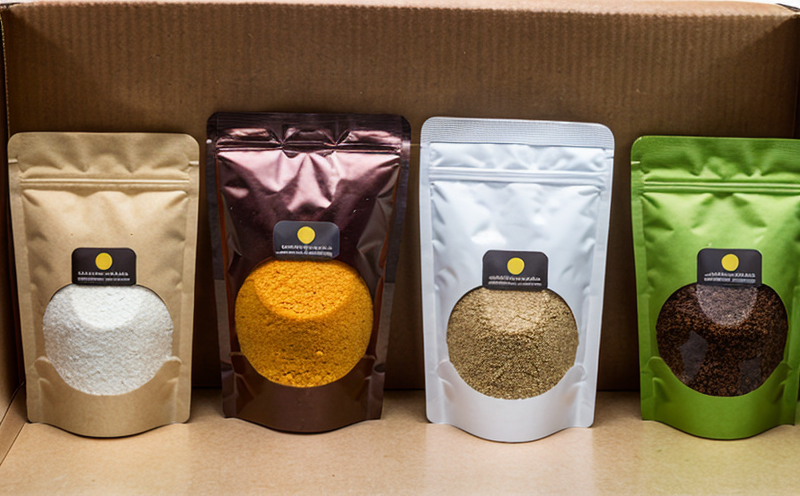Freezer Compatibility Testing of Food Packaging
In today’s competitive market, ensuring that food packaging meets freezer compatibility standards is paramount. Consumers expect their products to be safe and reliable, especially when they are exposed to freezing temperatures during storage or transportation.
The Freezer Compatibility Test evaluates the ability of a food contact material (FCM) or packaging to withstand freezing without compromising its integrity or contaminating the product it contains. This test is critical for ensuring that the packaging does not release harmful substances into the food, thereby maintaining safety and quality standards.
Our testing process begins with the selection of appropriate samples. These can include a variety of materials such as plastic films, laminates, or multi-layered structures commonly used in food packaging. Once selected, these materials undergo rigorous examination using advanced analytical techniques like Fourier Transform Infrared Spectroscopy (FTIR), Gas Chromatography-Mass Spectrometry (GC-MS), and Differential Scanning Calorimetry (DSC).
The test involves placing the sample into a freezer for an extended period. The duration of this exposure can vary depending on the specific requirements set by international standards such as ASTM D1748 or ISO 6905, which outline acceptable freezing temperatures and durations.
After removal from the freezer, the packaging is thoroughly inspected for any signs of damage, leakage, or deformation. Any changes in physical properties are also noted, including alterations in thickness, color, or texture. These observations help determine whether the material has maintained its integrity after exposure to cold conditions.
The primary objective of this test is not only to assess the mechanical strength and durability but also to ensure that there are no adverse effects on the food itself due to the packaging. This includes checking for migration of additives, leachates, or other potential contaminants into the food substance during freezing and thawing cycles.
Understanding how different FCMs behave under extreme temperature fluctuations is crucial for manufacturers who aim to provide safe and effective solutions. By conducting these tests early in the development process, companies can identify issues before they become costly problems further down the line.
The importance of freezer compatibility testing extends beyond just maintaining product quality; it plays a vital role in ensuring compliance with regulatory requirements imposed by various authorities around the world. For instance, many countries have specific guidelines regarding the materials allowed for use in direct contact with food items within refrigeration units.
- Use Cases and Application Examples:
- - Testing multi-layered packaging used in frozen meals
- - Evaluating plastic films intended for use in insulated containers
- - Assessing laminated structures designed for long-term freezer storage of perishable goods
- - Ensuring that the packaging used in pre-packaged frozen fruits and vegetables complies with relevant safety standards.
By leveraging our expertise in this area, we can help you navigate these challenges effectively. Our team consists of experienced professionals who stay updated on the latest developments in food packaging technology and regulatory changes.
Applied Standards
The Freezer Compatibility Test follows several internationally recognized standards that guide its execution. These include:
- ASTM D1748-18 Standard Practice for Determining the Resistance of Plastic Films and Sheets to Low Temperature: This standard provides methods for determining the low temperature resistance properties of plastic films and sheets. It includes procedures for testing flexibility, tensile strength, elongation at break, and other physical property changes.
- ISO 6905:2017 Plastic Films and Sheets – Resistance to Low Temperature: This international standard specifies the requirements for determining the resistance of plastic films and sheets to low temperature. It covers aspects such as flexibility, tensile strength, elongation at break, and other physical property changes.
- EN 13822:2005 Plastics – Determining the Resistance of Plastic Films and Sheets to Low Temperature: This European standard sets out the procedures for determining the low temperature resistance properties of plastic films and sheets. It includes tests for flexibility, tensile strength, elongation at break, and other physical property changes.
These standards provide a framework that ensures consistency and accuracy in our testing processes. They help us adhere to global best practices while meeting specific regional requirements.
Eurolab Advantages
At Eurolab, we pride ourselves on delivering comprehensive solutions tailored specifically for your needs. Here’s why choosing us as your partner in freezer compatibility testing can benefit you:
- Expertise and Experience: Our team comprises highly skilled professionals with extensive experience in food contact material evaluation.
- State-of-the-Art Facilities: We have access to cutting-edge equipment that allows us to perform precise measurements and analyses.
- Comprehensive Reporting: Every test result is meticulously documented, providing detailed insights into the performance of your packaging under freezing conditions.
- Regulatory Compliance: Our services ensure that you stay compliant with all relevant regulations governing food contact materials.
- Rapid Turnaround Times: We understand the importance of timely results and strive to deliver them quickly without compromising on quality.
- Cost-Effective Solutions: By providing accurate assessments upfront, we help reduce costs associated with rework or recalls later down the line.
With Eurolab by your side, you can rest assured that every aspect of your freezer compatibility testing will be handled expertly and efficiently.





